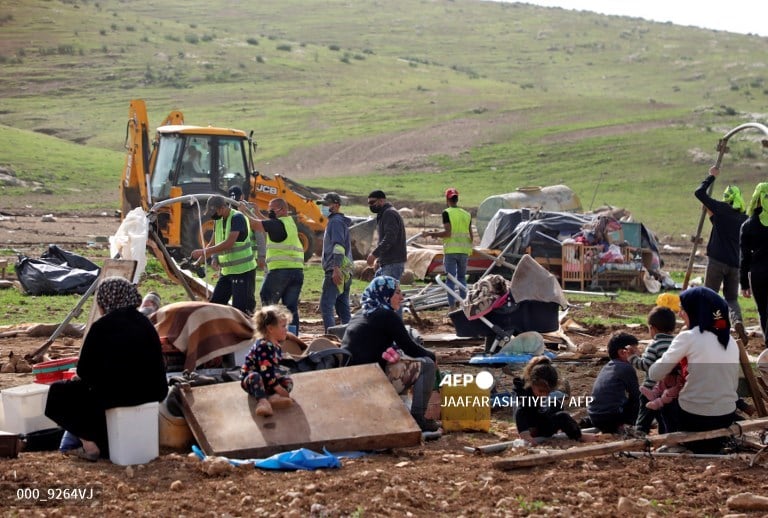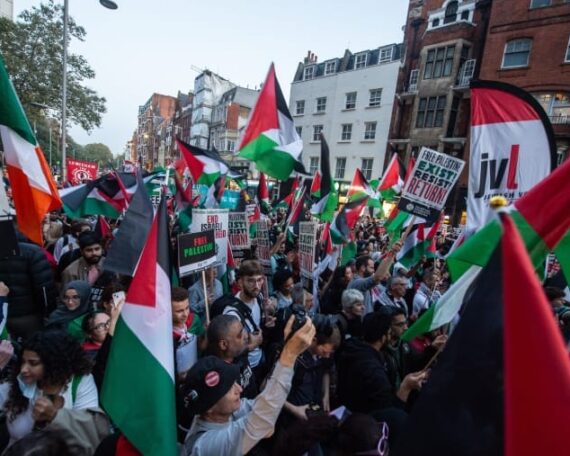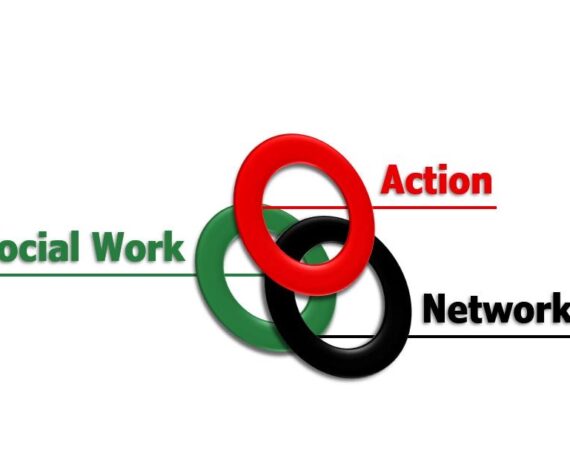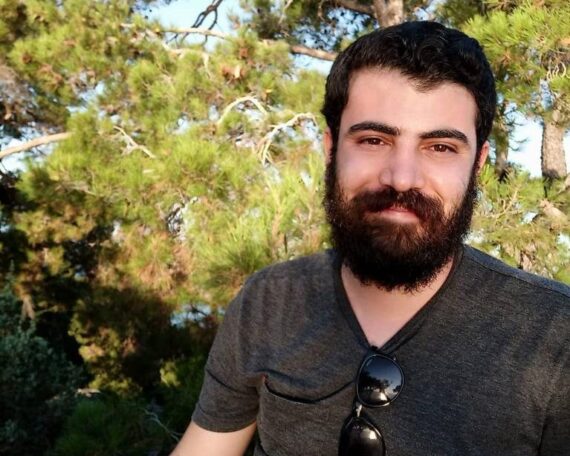Simon Cardy discusses the background to the call for the NSPCC to stop accepting cash donations from JCB.
SWAN has linked up with possibly its biggest collaboration with other networks and organisations to date namely: Protecting Palestinian Families Campaign, the UK–Palestine Mental Health Network, the Israeli Committee Against House Demolitions – UK (ICAHD-UK) and the Palestine Solidarity Campaign with the aim of stepping up the pressure on the NSPCC drop their partnership with J C Bamford Excavators Ltd (JCB). The coalition aims to support the efforts, led by the Protecting Palestinian Families Campaign, to persuade the NSPCC that it is incompatible with the charity’s core values to take donations from JCB, a British based company that has recently been named by the United Nations as complicit with Israel in violations of international law within the settlements/colonies in the occupied Palestinian Territories.
Timeline:
March 2019 – Shoal Collective publishes ‘Resisting Demolitions in Palestine. A Boycott, Divestment, & Sanctions Guide.
March 2019 – The NSPCC/JCB campaign is started by a group of individuals linked with Palestine Solidarity movement who formed the Protecting Palestinian Families Campaign- an offshoot of ‘Stop the Demolitions’
December 2019 – Lawyers for Palestinian Human Rights (LPHR) launch a formal complaint against JCB, a world-leading construction equipment company headquartered in Britain. The complaint is lodged with the UK National Contact Point (a government body which is part of the Department for International Trade) for the OECD Guidelines for Multinational Enterprises (situated in the Department of International Trade).
February 2020 – United Nations Human Rights Office issue a long-awaited report identifying 112 companies involved in business activities in settlements in the Occupied Palestine Territory in violation of International law. Among the companies identified is JCB, one of three UK companies on the list.
July 2020 – Protecting Palestinian Families launch a postcard campaign- 3000 send out to date.
August 2020 – Protecting Palestinian Families and ICAHD launch petition.
September 2020 – ICAHD UK Workshop
October 2020 – UK National Contact Point publishes its Initial Assessment decision on the human rights complaint against JCB. The National Contact Point accept that key aspects of the LPHR complaint are “material and substantiated” and will investigate further.
October 2020 – SWAN writes letter of concern to the NSPCC Chief Executive.
November 2020 – Some 73 people, including 41 children in one day, were made homeless when their dwellings were knocked down in the Bedouin settlement of Khirbet Humsa, in the Jordan Valley, according to a UN report.
December 2020 – NSPCC respond to Protecting Palestinian Families.
February 2021 – the same Bedouin community is demolished for the fifth time in a month, with JCB and Volvo equipment in use.
March 2021 – Day of action against the NSPCC coordinated by coalition of solidarity organisations and SWAN.
Ethnic cleansing
Some people might think that the mass expulsions and atrocities that accompanied the establishment of the State of Israel in 1948 and the creation of the world’s oldest refugee population are historical events. The reality is that the state of Israel is continuing with its policy of ethnic cleansing in what is increasingly recognised as an apartheid settler-colonial state, as B’Tselem, Israel’s state’s leading human rights organisation, has recently reported. In short, a process of ethnic cleaning continues to this day.
ICAHD says that during and after the Nakba of 1948, when the state of Israel was established, it systematically demolished about 52,000 Palestinian homes, more than 530 entire villages, towns and urban neighbourhoods. Since the beginning of the Occupation in 1967, Israel has demolished another 55,000 homes in the West Bank, East Jerusalem and Gaza. Thousands more continue to be demolished inside Israel itself.
Types of Demolitions
| Punitive demolitions | 3% of houses are demolished are destroyed as a punishment carried out against people associated with those houses. This policy was suspended by the Israeli army in February 2005 after it reached the conclusion that, rather than deterring attacks, punitive demolitions only inflame the people and lead to more attacks. The practice was resumed on 19 January 2009, |
| Administrative demolitions: | Houses are demolished for lack of a building permit. This happens in Area C and in East Jerusalem, under exclusive Israeli authority, though prior to the existence of Areas A, B & C it occurred in other areas as well. It is important to point out that in almost all cases, Palestinians have no choice but to build “illegally” as permits will not be granted. It is also the case that, in Area B, if a house is in close proximity to a military base or a road used by the military or settlers, it may also face administrative demolition. This type of demolition accounts for approximately 20% of defined demolitions. |
| Land-clearing operations/Military demolitions: | Houses are demolished by the IDF in the course of military operations for the purposes of clearing off a piece of land (for whatever reason), to achieve a military goal or to kill wanted persons as part of Israel’s policy of extrajudicial executions. Military demolitions characterized the massive destruction of Palestinian communities during the Naqba, and in the Occupied Territory they account for about 66% of defined demolitions carried out since 1967. |
| Undefined demolitions: | ICAHD is collecting information and investigating the status of many demolitions carried out between 1967-1982, when the Civil Administration begins its work. These include mainly demolitions resulting from land-clearing operations and removal of Palestinian populations. |
Source: ICAHD March 2020
The evidence against JCB
A number of organisations have documented compelling video, photographic and written contemporaneous evidence that substantiates the material and prolific use of JCB products in a number of specific demolition and displacement incidents, and in settlement-related construction.
ICAHD states that the demolition policy is ‘part of Israel’s attempt to Judaize Palestine, to transform an Arab country into a Jewish one’. During and after the Nakba of 1948, when the state of Israel was established, it systematically demolished about 52,000 Palestinian homes, more than 530 entire villages, towns and urban neighborhoods. Since the beginning of the Occupation in 1967, Israel has demolished another 55,000 homes in the West Bank, East Jerusalem and Gaza. Thousands more continue to be demolished inside Israel itself.
The primary sources of evidence are the prominent Palestinian human rights organisation, Al-Haq; the leading Israeli human rights organisation, B’Tselem; and the UK charity, EyeWitness to Atrocities.
A key piece of video evidence submitted with the LPHR’s complaint taken on 11 September 2019 can be viewed here.
The video footage shows a JCB vehicle in the South Hebron hills identifiable as the model 3CX, demolishing structures that are likely to be the six family homes reported in the B’Tselem commentary that accompanies the video.
The primary evidence submitted by LPHR that substantiates the material use of JCB products in demolitions, relates to incidents in ten villages or areas in the occupied Palestinian territory, covering a time period of 2016 to 2019. In total, 89 homes are identified as having been demolished, resulting in the displacement of at least 484 individuals, including children and the elderly. One school (Khirbet Tana Elementary School) is among other property documented to have been demolished, as are water tanks.
The evidence demonstrates that vulnerable Palestinian Bedouin communities in Area C of the occupied West Bank are frequently affected by demolitions and displacement, with associated human rights breaches that include the violation of the right to adequate housing under international human rights law.
Under the cover of Covid, with the world’s attention elsewhere and the number of international observers reduced, Israel has continued with home demolition throughout 2020.
As recently as last month, data collectedfrom the United Nations Office for the Coordination of Humanitarian Affairs, B’Tselem, Negev Coexistence Forum for Civil Equality, recorded that, for the month of January 2021, a total of 78 demolitions took place displacing 69 people, 36 adults and 33 children.
Although other machines produced by other companies are involved, JCB plant is consistently being used.
The NSPCCs response
To date, the NSPCC’s response has been craven.
In replies to Protecting Palestinian Families, the NSPCC have shown indifference and a willingness to mirror JCB’s position.
Sheren Green from ICAHD UK and Protecting Palestinian Families explains:
“Co-owner Lady Carole Bamford was on record as giving thousands to the National Society for the Prevention of Cruelty to Children (NSPCC), Indeed, the house where abused children receive the support they desperately need is called Carole House.
So, a carefully crafted letter was sent, acknowledging her benevolence but informing her of the destruction and devastation her products wreaked on innocent families, asking her to cut the company’s ties with Israel.
She didn’t answer so then it was time to ask the NSPCC to cut ties with JCB – how could they possibly accept money earned by traumatising Palestinian children?
A protracted correspondence ensued. CEO Peter Wanless brushed the first letter aside. Then each of the trustees was approached individually.
This time the respondent at least stated the charity’s ethical policy which meant they could not take money made by slavery, human trafficking or child labour. Money made from leaving children traumatised, homeless and impoverished in Palestine was apparently all right.
Dame Esther Rantzen was approached – her life-saving initiative ChildLine is now incorporated into the NSPCC – but she did not answer.”
After lengthy correspondence, the NSPCC eventually responded in December 2020.
The NSPCC states that it is “not associated with any organisation connected with slavery, human trafficking and child labour or where a director or officer has been convicted of a sexual offence” and as JCB is not identified within these criteria, the NSPCC does not agree that JCB has a case to answer.
The NSPCC accepts that JCB is included on a database published by the Office of the High Commissioner for Human Rights, says they have challenged JCB on this point and understand that in reply “JCB have requested immediate removal from the database”.
With regard to National Contact Point’s investigation following a complaint from Lawyers for Palestinian Human Rights, the NSPCC states that the investigation found “the claims related to JCB contributing to abuses of human rights does not merit further examination”.
Finally, The NSPCC have been told by JCB that “that all of the products they supply to Israel are via a third-party independent distributor, Comasco. They state that they have not sold any machinery directly to the Israeli authorities. They state that once products have been sold to Comasco, JCB has no legal ownership of them and they claim, therefore, they cannot stipulate to whom their products can or cannot be sold to.”
There are a number of problems with the NSPCC’s position.
First, the NSPCC’s ethical policy is very narrow in scope.
Second, the NSPCC seem willing to believe that JCB’s request that the UN remove its name from the data base, is sufficient defence: the UN has clearly not removed JCB from the list. The charity seems to make light of the fact that according to reports, accounting for the long delay in the UN’s publication of the list – none of the 112 companies had been identified lightly and – as you might expect – only after lengthy correspondence with the each of the companies named in the report.
Third, the NSPCC are being very selective in regard to the outcome of Contact Point’s initial investigation. Whilst it is true that the Contact Point investigation concluded that the claims related to ‘JCB contributing to abuses of human rights’ did not merit further examination, the Contact Point investigation did however conclude that the JCB’s apparent breach of three key corporate human rights responsibilities under the OECD Guidelines merited further investigation. According to these criteria, businesses should:
- Seek ways to prevent or mitigate adverse human rights impacts directly linked to its business operations and products by a business relationship.
- Have a policy commitment to respect human rights.
- Carry out human rights’ due diligence.
In contrast to what the NSPCC would like us to believe, the Contact Point complaint is far from over. The National Contact Point is now offering the parties an opportunity to mediate. If the parties do not want to mediate or cannot reach an agreement, the agency will examine if JCB’s actions and policies are consistent with the OECD Guidelines.
Summary
This article sets out the background to the call for the NSPCC to stop accepting donations from J C Bamford Excavators Ltd, a company named by the United Nations in February 2020 as in breach of its Human Rights obligations. The NSPCC claims that they are here for ‘every child’ but not it seems, if that child lives in Palestine.
twitter @simoncardy
Links and articles



